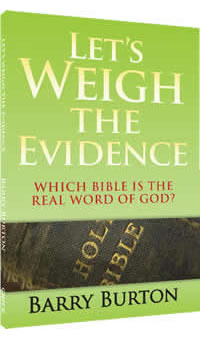Are Words Missing in the KJV?
- Issue Date: November/December 2005
Opponents of the King James Version like to say that there is an error in the text because Jesus' words "For thine is the kingdom, and the power, and the glory forever. Amen" are found in Matthew but not in Luke. In this excerpt from Answers to your Bible Version Questions, author David Daniels explains the discrepancy:
One reason God preserved His words, not just His "word" in general is because every single word is very important - to God and to us. When we look at the context of each Scripture, the answer to the differences between Matthew's and Luke's recording of the Lord's prayer becomes clear. Remember that, as you read, the terms of location and direction (up, down, into, out of) are very literally true.
The Context of Matthew
The time Matthew quotes Jesus' prayer is during the Sermon on the Mount (recorded in Matthew 5-7). Jesus was speaking to multitudes who came to hear Him. We find this proof in Matthew 5:1-2:
And seeing the multitudes, he went up into a mountain: and when he was set, his disciples came unto him: And he opened his mouth, and taught them, saying,"
After Jesus spoke what we find in Matthew during this sermon, He, His disciples and a multitude of people descended from the mountain. We find this at the beginning of chapter 8:
Matthew 8:1 When he was come down from the mountain, great multitudes followed him.
Two chapters later, Jesus commissioned His twelve disciples and called them apostles (Matthew 10:1-42).
The Context of Luke
However it is a different time and place where Jesus said a similar prayer in Luke. Jesus had already commissioned His twelve apostles in 6:13-16. That means it is later in time than Matthew's Sermon on the Mount. After this commissioning, the Lord Jesus Christ came down from a mountain (Luke 6:12, 17), not up into a mountain, with His apostles and other followers to a plain to speak to them. In Luke 10:1-24, Jesus Christ commissioned 72 others to heal and preach as well. Then in Luke 11:1, we read these words:
And it came to pass, that, as he was praying in a certain place, when he ceased, one of his disciples said unto him, Lord, teach us to pray, as John also taught his disciples.
Note two differences: 1) Jesus was praying in a certain place, not preaching to a multitude; 2) When He was finished, one of His disciples asked Him directly to teach them how to pray.
The differences between the two occurrences of the "Lord's Prayer" (really the "Disciples' Prayer") are perfectly explained by the fact that they were said on two completely different occasions, with two different audiences, and for different reasons.
That is nothing like the issue of the Alexandrian perversions removing God's actual words from the pages of Scripture. It is simply the exact words the Lord Jesus Christ said on two different occasions.
- See more articles on related topics:
- Bible Versions
- King James Bible
Other Articles from November/December 2005:
- 'Jack the Ripper' Memorial Home For Battered Women?
- Protestants Gaining Millions in Africa and Latin America - Vatican Worried
- Ex-JW Sued for Watchtower Quotes
- Chick Mail Bag Nov-2005
- New Ruling Opens Prisons to More Gospel Literature
- Prison Ministry Letters: Nov-2005
- New Definition of Science?
- 'Stone Age' Another Evolution Myth
- Tract Passing Tips - November 2005
- Jesus Wafer Auctioned On Ebay; Priests Horrified
- But Was It a Waste of Time?
More on Bible Versions:
Products of Interest:
-

Answers to Your Bible Version Questions
224 pages
David W. Daniels answers difficult questions about the KJV. Learn how to defend the KJV and why you can trust it. -

Let's Weigh the Evidence
96 pages
In simple language, this book provides the basics of the Bible version issue, showing why the King James is the only Bible you can trust. Compare the solid history of the King James Bible with the new Bibles that remove Christ’s Virgin Birth and His Second Coming. Learn about Westcott and Hort’s bait-and-switch, missing verses and words, the Living Bible’s tampering, copyright issues, and more!



